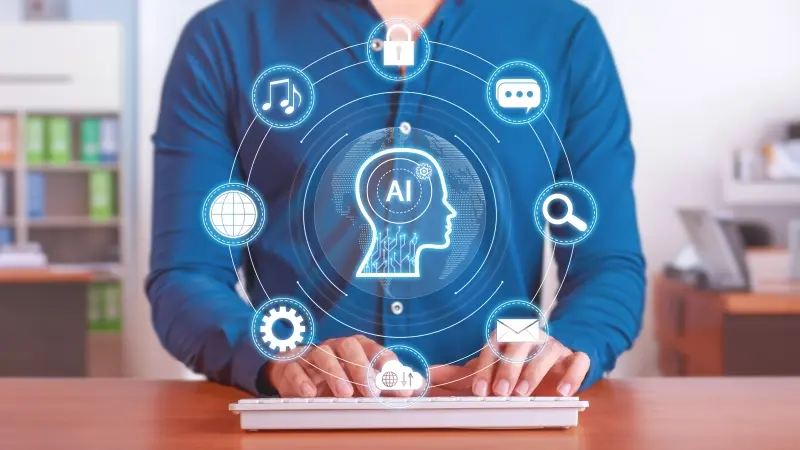Discover how to leverage artificial intelligence (AI) to enhance your digital marketing strategies, improving efficiency and personalization for better results.
Artificial intelligence (AI) is revolutionizing various industries, and digital marketing is no exception.
By integrating AI technologies, marketers can enhance the efficiency and effectiveness of their campaigns, personalize interactions with customers, and gain valuable insights into consumer behavior.
Also Read
Here’s how to effectively leverage AI in your digital marketing efforts to drive better results.
1. Enhance Personalization
AI excels at processing large amounts of data to identify patterns and preferences among your target audience.
By using AI-driven analytics, you can personalize your marketing messages based on user behavior, past interactions, and preferences.
Tools like AI-powered recommendation engines can suggest products or content that individual users are more likely to engage with, thereby increasing the chances of conversion.
2. Improve Customer Segmentation
With AI, you can go beyond traditional demographic segmentation and use behavioral data to create more nuanced customer segments.
AI algorithms analyze how different segments interact with your content and purchase products, allowing you to tailor your marketing strategies to fit the specific needs and preferences of each segment.
This targeted approach can significantly boost the effectiveness of your campaigns.
3. Optimize Content Creation
AI can assist in creating compelling content by suggesting topics, generating text, and optimizing headlines based on trending keywords and phrases.
Tools like AI content generators can help produce draft articles, social media posts, and marketing copy, which you can refine to fit your brand’s voice.
This not only saves time but also ensures your content is optimized for SEO and engagement.
4. Automate Customer Interactions
Chatbots and virtual assistants powered by AI can handle a multitude of customer interactions without human intervention.
These tools can provide instant responses to customer inquiries, assist with booking orders, and offer personalized shopping advice.
Automating these interactions can improve customer experience and free up your human staff to focus on more complex tasks.
5. Streamline Email Marketing
AI can transform your email marketing strategy by optimizing sending times, personalizing email content, and segmenting your audience based on their interaction history.
AI-driven tools can analyze when subscribers are most likely to open emails and schedule them accordingly.
This ensures higher open rates and engagement, making your email marketing efforts more effective.
6. Enhance Ad Targeting
AI improves the accuracy of your ad targeting through predictive analytics and machine learning models.
By analyzing past ad performance and user interactions, AI can predict which demographics are most likely to engage with specific ads.
This allows you to refine your ad placements and content, ensuring that your budget is spent on ads that yield the highest ROI.
7. Predict Consumer Behavior
Predictive analytics is a powerful AI application that can forecast future consumer behaviors based on historical data.
This insight allows marketers to anticipate market trends, understand customer needs, and create products and services that meet future demands.
Predictive analytics can also help in anticipating churn rates and developing retention strategies tailored to individual customer needs.
8. Optimize Website Experience
AI can analyze how users interact with your website and suggest changes that can improve user experience.
By using tools like heatmaps, session recordings, and behavior analytics, AI can help understand user flows and bottlenecks on your site.
Implementing AI-driven insights to optimize navigation, page layouts, and call-to-action placements can lead to better user engagement and increased conversions.
9. Monitor and Analyze Campaign Performance
AI tools provide comprehensive analytics that helps you measure the performance of your marketing campaigns across different channels.
By analyzing data in real-time, AI can give insights into what’s working and what’s not, allowing you to make data-driven adjustments to your campaigns quickly.
This agility is crucial in the fast-paced world of digital marketing, where consumer preferences can change rapidly.
10. Drive Real-Time Decisions
AI’s ability to process and analyze data in real-time enables marketers to make informed decisions quickly.
Whether it’s adjusting bid prices on ads, changing distribution strategies based on inventory levels, or responding to emerging trends on social media, AI empowers marketers to act swiftly and effectively, keeping their campaigns ahead of the competition.
Leveraging AI in digital marketing not only enhances operational efficiencies but also boosts the personalization and relevance of your marketing efforts.
As AI technology continues to evolve, its integration into digital marketing strategies becomes essential for businesses looking to stay competitive in a crowded and fast-evolving marketplace.
By adopting AI, marketers can deliver more personalized, engaging, and successful marketing campaigns that drive better results and greater customer satisfaction.














